The importance of business education for youth cannot be overstated. Organizations like SkillSpring Foundation, a non-profit led by high school students, are stepping in to offer free virtual business courses for youth aged 8–14, addressing a key deficiency in traditional K-12 education. This initiative is not just about teaching basic business concepts; it also aims to foster entrepreneurial thinking and prepare young minds for the challenges of the modern workplace.
Why Early Business Education Matters
Introducing children to business concepts at an early age can have transformative effects on their personal and professional growth. For example, early exposure to entrepreneurship helps kids develop critical thinking, problem-solving, and financial literacy skills. These are all essential for navigating real-world challenges, whether they choose to start their own business or pursue other career paths.
Moreover, youth business education fills a significant gap left by traditional curricula, which often focus heavily on standardized subjects like math and science while neglecting practical life skills. By learning how to create budgets, pitch ideas, and manage projects, children gain hands-on experience that builds confidence and prepares them for future success.

SkillSpring Foundation: A Non-Profit Making a Difference
SkillSpring Foundation stands out as an inspiring example of youth-led innovation. Founded by high school students, the non-profit offers free virtual courses designed specifically for young learners aged 8–14. These courses cover a range of topics, including financial literacy, marketing basics, and entrepreneurial strategies.
One of the unique aspects of SkillSpring’s program is its accessibility. By offering virtual classes, the organization ensures that students from diverse backgrounds can participate, regardless of their geographic location. This is a game-changer in providing equal opportunities for learning.
Additionally, SkillSpring’s focus on mentorship gives students the chance to interact with older peers and industry professionals. This encourages a mentorship culture where young learners can see tangible examples of success, motivating them to pursue their own entrepreneurial dreams.

The Long-Term Impact of Early Entrepreneurship Education
The benefits of early entrepreneurship education extend far beyond the classroom. For instance:
- Career Preparedness: Students who understand business basics are better equipped for future job markets.
- Enhanced Creativity: Entrepreneurial thinking encourages innovative solutions to problems.
- Financial Awareness: Learning about budgets and investments helps build lifelong financial responsibility.
- Leadership Skills: Managing projects and pitching ideas fosters confidence and collaboration.
As a result, programs like those offered by SkillSpring Foundation are preparing the next generation of leaders, innovators, and problem-solvers. By planting the seeds of entrepreneurship early, these initiatives ensure that young minds are equipped to tackle the challenges of the 21st century.
For more information on the importance of early business education, you can explore resources like the Entrepreneurship page on Wikipedia or learn about its global significance from Britannica’s guide on entrepreneurship.
Readability guidance: Use short paragraphs and lists to summarize key points; ensure each H2 provides valuable insights; use transition words like “however,” “therefore,” and “for example” to maintain a logical flow.


